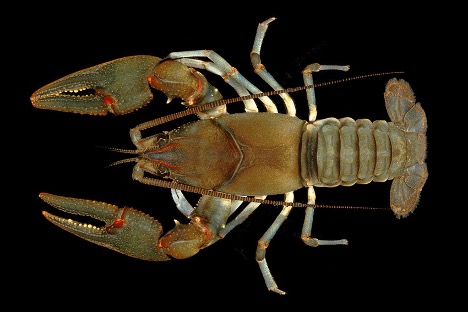Lawsuit launched to protect endangered crayfish pushed to the brink of extinction by coal mining in Appalachia
For Immediate Release, April 6, 2023
Contact: Perrin de Jong, Center for Biological Diversity, perrin@biologicaldiversity.org
Erin Savage, Appalachian Voices, erin@appvoices.org
CHARLESTON, W.Va. — The Center for Biological Diversity and Appalachian Voices filed a formal notice today of their intent to sue the U.S. Office of Surface Mining Reclamation and Enforcement and the U.S. Fish and Wildlife Service for failure to protect the endangered Guyandotte River crayfish and the threatened Big Sandy crayfish from coal mining pollution. Both species are protected under the Endangered Species Act.
The Center and Appalachian Voices have uncovered 388 coal mining facilities in West Virginia, Kentucky and Virginia that pollute critical habitat for the imperiled crayfish, yet lack required plans to protect the crayfish or their habitat. According to the U.S. Fish and Wildlife Service’s binding biological opinion from 2020, all such facilities must implement sufficient protective measures to avoid the risk of extinction for listed species before any coal mining may take place.
“Nobody, and I mean nobody, is doing their job to guard against extinction here and the process to protect wildlife from coal mining is just being ignored,” said Perrin de Jong, Southeast staff attorney for the Center. “The states and the feds are blowing past the law’s clear command to protect these rare crayfish and their homes in Appalachian mountain streams. They’re too busy helping the coal industry continue the wholesale destruction of watersheds that drove these crayfish to the edge of extinction in the first place.”
West Virginia, Kentucky and Virginia are responsible for regulating the coal industry within their borders. However, the U.S. Office of Surface Mining Reclamation and Enforcement oversees state regulation of coal mining and the Service has a duty to ensure that proper protections are in place to avoid harm to threatened and endangered species. The agencies created a process to protect these species through the development of Protection and Enhancement Plans, but hundreds of mines that harm protected wildlife do not have these plans in place.
“These crayfish are an important indicator of the overall health of Appalachia’s rivers and streams. Clean water is a vital resource not just for wildlife, but also for our people’s health and wellbeing, and for the economic resilience of our communities,” said Willie Dodson, central Appalachian field coordinator for Appalachian Voices. “It’s not surprising that mining companies are cutting corners when it comes to their impacts on waterways, but it is very disappointing that the Office of Surface Mining Reclamation and Enforcement and the Fish and Wildlife Service seem to be asleep at the wheel. We need both agencies to do their jobs and ensure that our rivers and streams aren’t destroyed by reckless mining companies.”
In response to previous litigation by the Center and allies, the Service issued a 2020 biological opinion requiring any mines that could harm protected species like the Guyandotte River and Big Sandy crayfishes to develop comprehensive plans to avoid and minimize that harm before any mining could take place. Nearly three years later, 84% of mines within 3 miles upstream from designated critical habitat for these crayfish lack any such protective plans. Despite these deficiencies, mining continues unabated throughout these watersheds.
While Kentucky, West Virginia and Virginia are all failing to protect these species from coal mining impacts, today’s notice documents how the Office of Surface Mining Reclamation and Enforcement is doing nothing to enforce species protection requirements in the states. The notice also documents how the Service is failing to ensure that adequate protective measures are in place to avoid harm to the crayfish.
Background
The Guyandotte River crayfish has been wiped out from 93% of its range, and now only lives in two creeks in West Virginia. The Big Sandy crayfish has been wiped out from more than 60% of its range and survives in the upper Big Sandy River basin across southern West Virginia, eastern Kentucky and southwest Virginia. Both species were pushed to the edge of extinction by coal mining pollution.
Scientific studies have linked coal mining to declines in birds, fish, salamanders, crayfish, insects and freshwater mussels. More than 1 million acres of hardwood forest and more than 2,000 miles of streams have already been destroyed by surface coal mining in Appalachia.
Mining also threatens nearby communities with air and water pollution and risk of flooding. More than 20 peer-reviewed scientific studies have now linked mining pollution in Appalachia to health problems, including increased risk of cancer, cardiovascular disease and birth defects.

Big Sandy crayfish photo by Guenter Schuster. This image is available for media use.
###
The Center for Biological Diversity is a national, nonprofit conservation organization with more than 1.7 million members and online activists dedicated to the protection of endangered species and wild places.
Appalachian Voices is a regional nonprofit organization that brings people together to protect the land, air and water of Central and Southern Appalachia and advance a just transition to a generative and equitable clean energy economy.



